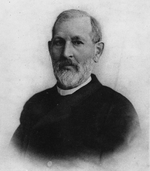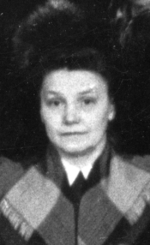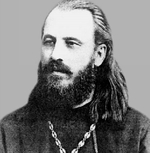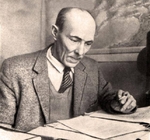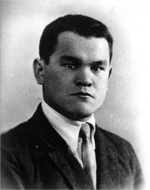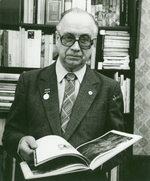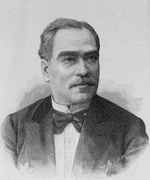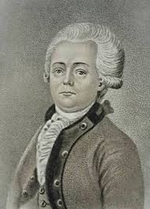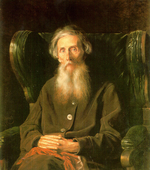Articles
Bulgakovsky (till 1864 Bulgakov) Dmitry (1843 – after 1920)
Bulgakovsky (till 1864 Bulgakov) Dmitry (1843 – after 1920) – priest, ethnographer, publicist, local historian, specialist in folk religious phenomena.
He studied at the Livny Spiritual School, the Orel Seminary, the Minsk Seminary. In 1869, he became priest. He taught Russian and Old Slavic languages at spiritual schools and served. Since 1874, he wrote articles for various media. In 1890, he refused from his practical church service, and in 1902, he took off the rank of priest. He lived in the Western Region, in St. Petersburg, in Gatchina; in 1917 he moved to the Yaroslavl Region; he spent his last years in Cheboksary studying Chuvask folklore.
Materials on ethnography and local history published by B. are precious sources for research in the field of folk religious phenomena.
Read More
Buslaev Fedor (1818–1897)
Buslaev Fedor (1818–1897) – philologist, linguist, folklorist, specialist in folk religion and Slavic mythology, historian of culture; Correspondent Member of the Imperial Ac. of Sc. since 1852, Academician since 1860; lecturer of the Moscow University.
After the Penza Gymnasium, where among his teachers was V. G. Belinsky, he enrolled to the Moscow University and received state financial support. The most influential professors for hum were historians M. P. Pogodin, S. P. Shevyrev, I. I. Davydov. But the main figure for B. was founder of the mythological school in folkloristic J. Grimm; B. also was under the strong influence of linguistic works by W. von Humboldt and research by founder of comparative linguistic F. Bopp. Later B. was interested in works by E. Renan.
Read More
Butinova (Dolgonosova) Maria (1920—2007)
Butinova (Dolgonosova) Maria (1920—2007) – ethnographer, historian of religion.
In 1938, she entered the Chair of Ethnography of the Leningrad State University. In February 1942, she was evacuated to Saratov together with the University. In 1942—1945, she studied at the post-graduate courses of the Leningrad State University. In 1945—1952, she taught at the Chair of Ethnography (in the frames of the Oriental Faculty of the Leningrad State University till 1949, and in the frames of the Historical Faculty in 1949—1952). In 1951, she took part in the organization of the constant exhibition of the Department ‘Peoples of Australia and Oceania’ of the Museum of Anthropology and Ethnography.
Read More
Butkevich Timothey (1854–1925)
Butkevich Timothey (1854–1925) – priest, ecclesiastic publicist of the so called ‘accusatory theology’, participant of the right Monarchist movement.
After the Moscow Spiritual Academy he became priest; in 1882, transferred to the city of Kharkov. In 1884, for his composition ‘The Life of Our Lord Jesus Christ’ he got his master degree in Theology. In that work he criticized rationalistic interpretations of New Testament, first of all – that one of the Tubingen School of Protestant theology, represented by E. Renan.
Since 1893, he has been Archpriest of the Cathedral in Kharkov, Prof. in Theology at the Imperial Kharkov University (1894); since 1906 – member of the State Council; member of Monarchists ‘Black Hundred’ organizations (‘chernaya sotnya’).
Read More
Chernetsov Valery (1905–1970)
Chernetsov Valery (1905–1970) – ethnographer, linguist, archeologist.
He studied for engineer in Moscow. In 1923, he worked at the geodesic expedition at the North Urals. In 1923-1925, he lived among Ob’ Yugra, learnt Mansi language. Since then, he has been interested in the history and ethnography of the Uralian peoples.
Ch. graduated from the Ethnographic Department of the Geographical Faculty of the Leningrad State University with the specialization in the ethnography of Finno-Ugric peoples (1930). His supervisor was V. G. Bogoraz. He was the author of the first alphabetic book, Mansi-Russian dictionary, and Mansi language manuals. He worked at the Institute of the Peoples of the North, Docent of the Leningrad Herzen Teachers-Training Institute (1932-1936), and the Museum of Anthropology and Ethnography of the Ac. of Sc. of the U.S.S.R. (1935-1940).
Read More
Chetkarev Ksenofont (1910–1956)
Chetkarev Ksenofont (1910–1956) – folklorist, ethnographer, writer.
In 1928, he entered the Saratov University; he was transferred to the Mari Department of the Kazan Teachers-Training Institute and graduated from it in 1931. He was Director of the Mari State Theatre (1931), Director of the Mari School of Arts (1931-1933).
Post-graduate courses of the Institute of Ethnography of the Ac. of Sc. of the U.S.S.R. in Leningrad (1934-1937), supervisor M. K. Azadovsky. In 1934, he was an active participant of the group on studying religious beliefs of the peoples of the U.S.S.R. under the supervision of N. M. Matorin.
Candidate Thesis: ‘Mari folktales of the Ronguin District’ (1937) – he was the first Mari with the Candidate degree.
Director of the Mari Research Institute (1938-1941, 1945-1946, 1951-1954).
Read More
Chistov Cyril (1919‒2007)
Chistov Cyril (1919‒2007) – ethnographer, folklorist.
1937‒1941 ‒ student of the Philological Faculty of the Leningrad State University (Chair of Folklore).
In 1941, he was volunteer at the guerilla battalion. September 1941 – May 1944 – in Nazi captivity. May ‒ December 1944 – in the regular Army.
1946‒1947 ‒ at the post-graduate courses of the Chair of Folklore, Philological Faculty of the Leningrad State University. His supervisor was M. K. Azadovsky.
Read More
Chistovich Illarion (1828–1893)
Chistovich Illarion (1828–1893) – ecclesiastic historian, statesman.
Doctor in Theology (1871); thesis ‘Ancient Greek World and Christianity in relation to the problem of human immortality and afterlife’. Correspondent Member of the Imperial Ac. of Sc. at the Department of Russian language and literature (1874). Privy Councilor (1882).
He finished the Kaluga Seminary (1847), then he graduated from the St. Petersburg Spiritual Academy (1851) with the Master Degree in Theology. His supervisor was A. A. Fisher. In 1851-1873, made lectures at the St. Petersburg Spiritual Academy in philosophy and psychology. Since 1851, he has got a position of Bachelor (teacher) in Russian ecclesiastic and civic history, since 1856, he has been Ass. Professor at the Chair of Philosophy, since 1859 – Full Professor.
Read More
Chulkov Mikhail (1744–1792)
Chulkov Mikhail (1744–1792) – writer, folklorist, economist.
He was born in Moscow in a soldier’s family; learnt at the gymnasium of the Moscow University (1755-1758); his teachers were S. E. Desnitsky, M. I. Popov, I. A. Tretyakov. He was actor of the University – and then St. Petersburg Court (since 1761) theatres. He served as a footman and a quartermaster (1765-1769). Since 1770, he has entered state service as a clerk of the Senate (1770-1792). In 1789, he got hereditary gentry state. In 1792, he became Court Councelor, Secretary of the Senate.
Read More
Dahl Vladimir (1801–1872)
Dahl Vladimir (1801–1872) – linguist, folklorist, lexicographer.
After graduation from the Dorpat University, D. went to military service as medicine doctor. In 1832, he published ‘Russian Folk-Tales from the Oral Tradition Transferred to Civic Grammar, Adapted to Common-Day Life, and Decorated with Popular Proverbs by Cossack Vladimir from Luhansk’; the book was accepted for his Doctor thesis in Philology, but soon the publication was prohibited by censors because of a tale about a small devil and a soldier – they saw a critical hint at the emperor in it.
Read More
Showing 41-50 of 351 items.


